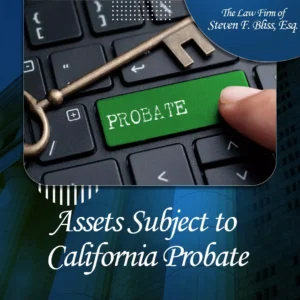In California, probate applies to assets that do not have a direct method of transfer upon death. Probate is the court-supervised process of validating a will, paying debts, and distributing property. Assets that are solely owned by the decedent without a beneficiary designation or joint ownership are generally subject to probate. Understanding which assets fall under probate jurisdiction is essential for families to prepare for the process and, where possible, plan to avoid it.
 One major category of probate assets includes real estate owned solely by the decedent. If a person dies owning a house in their name alone, and it is not titled in a trust or held as joint tenancy with right of survivorship, the property must go through probate. California real estate is often the largest asset in an estate, making this one of the most significant triggers for probate proceedings.
One major category of probate assets includes real estate owned solely by the decedent. If a person dies owning a house in their name alone, and it is not titled in a trust or held as joint tenancy with right of survivorship, the property must go through probate. California real estate is often the largest asset in an estate, making this one of the most significant triggers for probate proceedings.
Bank accounts, investment accounts, and securities without a payable-on-death (POD) or transfer-on-death (TOD) designation are also subject to probate. In California, financial institutions cannot release these assets until a court authorizes the executor or administrator. By contrast, accounts with updated beneficiary designations pass directly to named beneficiaries, bypassing probate entirely. Regularly updating these designations is one of the easiest ways to avoid probate for financial accounts.
Personal property is another category subject to probate. This includes vehicles, jewelry, art collections, and other valuable belongings that do not have co-owners or special designations. While smaller estates valued under $184,500 may qualify for simplified transfer procedures using a small estate affidavit, larger collections of personal property often require probate court involvement to ensure proper distribution to heirs.
| Asset Type | Subject to Probate? | California Tip to Avoid Probate |
|---|---|---|
| Real Estate (solely owned) | Yes | Place property in a living trust or title as joint tenancy |
| Bank & Investment Accounts | Yes, if no POD/TOD beneficiary | Add beneficiary designations |
| Personal Property (valuables) | Yes | Use small estate affidavit if under $184,500 |
| Life Insurance & Retirement Accounts | No, if beneficiary named | Keep beneficiary designations current |
| Jointly Owned Property | No | Use joint tenancy or community property with survivorship |
Another commonly overlooked probate asset includes business interests solely owned by the decedent. Shares in a closely held corporation, partnership interests, or membership units in an LLC without proper succession planning will generally require probate to transfer ownership. Business owners in California are encouraged to use buy-sell agreements or trusts to ensure smooth transitions and avoid disruptions caused by probate proceedings.
In conclusion, assets subject to probate in California include solely owned real estate, bank accounts without beneficiaries, personal property, and business interests lacking succession plans. By contrast, assets in trusts, those with valid beneficiary designations, or property held in joint tenancy avoid probate. Californians can reduce probate exposure by updating designations, using living trusts, and employing small estate procedures. Proper planning not only saves money and time but also provides peace of mind and privacy for surviving family members.






